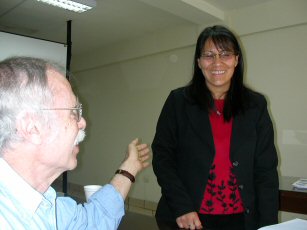Mario Vargas Llosa Teaches (Practical) Spanish
Note: This Mario Vargas Llosa page is part of a series of blogs that we did while learning Spanish language in Peru. Each blog focuses on one or two language learning activities. They are designed so show you how to implement Walkabout language learning activities. Use our examples here for any language you want to learn. See the "More Peru Stories" list of links on this page for additional language learning techniques. Also see our Learn Spanish section.
 Terry learns Spanish by studying Mario Vargas Llosa
Terry learns Spanish by studying Mario Vargas LlosaAnn Marshall
We are learning Spanish language in Peru, with small classes, a flexible school – and help from Mario Vargas Llosa. Plus, good teachers make it possible to design a program that really fits each student's needs. They care about their students here; they go the extra mile to make sure students come away both satisfied with their classes and more skilled in their Spanish language ability.
Ann and I struggled at first because of the school's strong emphasis on grammar. That changed, though, when we dropped group classes and went to private lessons.
Mario Vargas Llosa is Too Hard
My primary teacher, Jacky (Jakeline Conde Roque) is an avid reader. Her passion for literature comes through in her approach to language learning activities. She itched to introduce us to Spanish-language literature: first, the Nobel Prize winning Peruvian writer, Mario Vargas Llosa. She asked me to read a selection. It proved too difficult: I'm a first grader when it comes to reading Spanish. You can assess your language level too.
Next, she used listening as one of our language learning activities. She brought in a cassette of Mario Vargas Llosa reading Oliver Twist in Spanish – both to sharpen our listening skills, and to move us into literature. Good exercise: we knew the story (vaguely – it's been a long time), so we could concentrate on the learning foreign language. We were enchanted with his reading, but still, we had to listen three or four times before we even began to understand.
More Peru Stories
Intensive Spanish
Something Easier
Jacky doesn't give up easily. She continued our language learning activities. She brought in a short Spanish-language essay on Mario Vargas Llosa adapted for the classroom, then essays on Machu Picchu and Hiram Bingham (the Yale prof who re-discovered Machu Picchu), and a newspaper article on the agreement signed by the government of Peru and Yale University under which Yale will return some 4,000 artifacts taken from Machu Picchu to a new museum to be built in Cusco. We worked through them, learned a lot, added plenty of words to our vocabulary list, and identified some language patterns to work on.
Jacky went back to literature for more language learning techniques. After Mario Vargas Llosa, she introduced us Paulo Coehlo, the best-selling Brazilian writer. Lending us her personal copy of his book, she said, "He writes more simply," she told us. We tried. Still too difficult. Last night I went out and bought two copies of Coehlo’s Once Minutos (Eleven Minutes), one in Spanish, the other in English. I plan to try the Oliver Twist trick – read the book in English to get the storyline, meet the characters, understand the setting, get a sense of his writing style, then read it in Spanish to concentrate on learning foreign language.
In the spirit of Walkabout Language Learning™, Jacky also tied our weekend travels to the class. We concentrated on stories such as our trip to Machu Picchu (click here for Chela’s story in Waiting for a Jewelry Buyer), our experiences with the child-vendors at Ollantaytambo (click here for High Finance in Changing Money). As a variation on the Prepare → Practice → Communicate steps of the Daily Learning Cycle, we prepared oral stories about our weekend adventures, delivered them during class, then refined our communication by translating them as short essays into Spanish. Jacky urged us to write them first in English, then translate them.
I Practice Spanish Translation
The English-first language learning techniques, she emphasized, would allow us to expand our foreign language learning efforts. Spanish translation would usher us into more complex sentence structures and expand our vocabularies. She was right. It does both – but you need to work with your mentor on these to correct errors and refine usage. The weekend stories also brought home how to talk about events in the past, using Preterito Indefinido and Imperfecto correctly, without ever mentioning the terms. Who knew that Preterito Indefinido and Imperfecto would fit so comfortably into Walkabout Language Learning™?
Yesterday, we began talking about what we plan to do next weekend, then the following weekend after we leave Cusco, and the weeks after we return to the U.S. She didn't say a word about learning the future tense – we're learning it, as we envisioned, by example, not by memorizing linguistic rules.
And, through this process, together we've begun sprinkling the class with impromptu language learning activities, like three-minute drills to drive home proper patterns and verb forms to replace those we use incorrectly. She's good at it. We like it. We're all learning something. In short, classes now are going splendidly.
Language Learning Activities
- Use all possible input and output modes in your language learning activities. Tell weekend stories – they're a natural way to learn the past tense.
- Write your stories down – writing builds naturally on your oral stories.
- Write more complex stories in your mother tongue, then translate them to your target language – you'll expand your vocabulary and command of grammar naturally.
- Read stories in the language you are learning.
- Listen to stories in your target language.
–Posted by Terry, October 24
October 30 update: Today was our next-to-last class and Jacky gave us a written review, which we worked on individually, then discussed orally. It captured expertly everything we worked on this past month. It emphasized practical examples. None of it was designed to catch us with narrowly-focused rules. It brought all our language learning techniques and class work together in a single package. She didn’t mark up our answers, leave them bleeding, and post a score.
When we finished, she went over it with us, and used it to guide our final practice and lay out direction for further study. This review was a perfect example of the fifth step of the Daily Learning Cycle: Evaluate. It was a macro-evaluation of all we worked on for the past four weeks.
She's amazing, Jacky is. It took a huge amount of work to write a review like this, none of it canned. She pulled examples from every lesson we've had, and presented it in a way that will guide us in the future. What a tribute to Maximo Nivel: they have some really fine teachers here. They go the extra mile. Thank you, Jacky. Thank you, Mario Vargas Llosa – some day we will read and understand your work.
2010 Update: Mario Vargas Llosa was awarded the Nobel prize in literature.
Whether you want to read Mario Vargas Llosa in Spanish or just buy fruit from a local vendor, you can create a language learning program tailored to your specific needs. If you want a step by step guide that shows you how, download the Walkabout Language Learning Action Guide.
← Previous: Changing money Next: The Road to Moray →
Return from Mario Vargas Llosa to Language Lore
Return to Your Language Guide home
Stay in Touch with Language Lore ezine
Want to stay in touch? Subscribe to Language Lore, our internet language learning email newsletter. This free ezine facilitates your language learning journey. See our back issues here.
Go to your email now to confirmation your subscription. If you don't see an email within an hour (check your junk mail folder too), please contact us. We respect your privacy and never sell or rent our subscriber lists. If you want to get off this list later, one click unsubscribes you.

New! Comments
Have your say about what you just read! Leave me a comment in the box below.